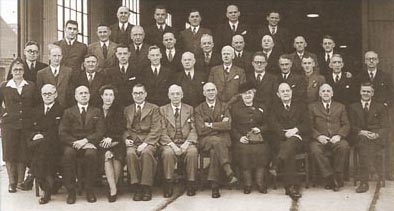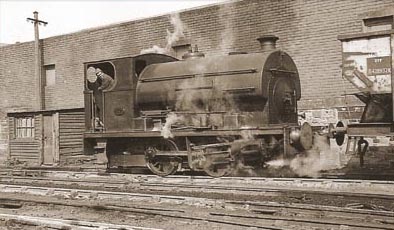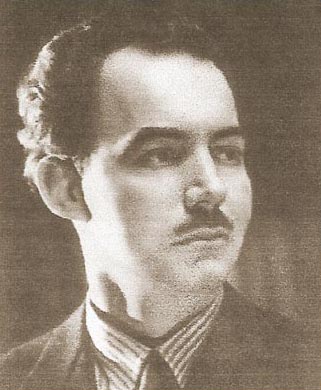ROYAL ORDNANCE FACTORY HIRWAUN
Some three years after the outbreak of the second world war and as a result of the enemy bombing of munitionfactories in England, it became necessary to find sites in less vulnerable areas. Officials from the Ministry of Supply decided that part of HirwaunWrgant common lying between the main Cardiff to Swansea main road and the GreatWestern railway line, to be ideal and set about buying the land.
Samuel Williams, the owner of Nantllechau Farm, Rhigos received a form of requisition from the Ministry of Supply, declaring its intention of taking possession of part of his land. Other farmers and cottagers received similar notifications.

Mr Gilbert Barling,then manager of the Tower Colliery was consulted about finding an abundant and constant source of water and he recommended Llygad Cynon in Pontprenllwyd, Penderyn – a pool fed by an underground spring which had never been known to run dry.
Additional railway lines, for a siding at Nantllechau and then on the ROF were constructed and it was in this factory that a large proportion of the local population (especially women) worked for the rest of the war years.
This Royal Ordnance Factory known as Royal Ordnance Factory Number 26 was built between May 1941 and February 1942 and specialised in small arms ammunition manufacture. It covered an area of 1.7Km east to west by 1.0Km. At the end of the war, in 1945, the Board of Trade took over the site for use as an industrial estate and it is still used as such today – taking on a new role and acquiring a new name – THE HIRWAUN INDUSTRIAL ESTATE.
During the second world war, Mr. David J. Harrison of Hirwaun was the Royal Ordnance Factory’s Entertainment Officer. As well as doing his ‘day job’ he was responsible for ‘entertaining’ the workers at the factory. It was thought that this helped to raise the spirits of the factory workers during these very depressing times and it also helped to raise money for the ‘Salute the Soldier Campaign’.
On the 3rd.July,1944, he arranged for the famous Polish Army Choir to perform at the factory. The principal soloist that day was the splendid Polish bass-soloist Marian Zygmunt-Nowakowski who went on to perform in leading roles in Covent Gardens after the war but during the war, after the defeat in France, he had come to Scotland along with his compatriots in arms. Already a trained singer he became an active member of the Polish choir and appeared regularly as their soloist. Amongst the songs sung by Lieutenant Zygmunt- Nowakowski that day were ‘Within these sacred bounds’ from the opera ‘The Magic Flute’ and ‘Rogues like you’ from the opera’ Il Seraglio’, whilst the choir sung a selection of Scottish and Polish songs.

The choir had travelled from Scotland and Mr. Harrison arranged for them to be met at the local railway station. After the concert, which lasted for some two hours, they stayed overnight at The Hostels before travelling back to Cardiff the next day. Marian Nowakowski was married to Julia Demska, his lifelong partner. They had four daughters. He died in the year 2000, aged 87. Mr. Harrison subsequently wrote to the C.O. of the ChorWojskaPolskiego (Polish Army Choir), Major LudwikSkibinski, thanking him for the visit, assuring him it was one of the finest concerts ever heard at the factory.Mr. Harrison also arranged a broadcast of ‘Workers Playtime’ from the factory on the 17thApril,1945. The artists taking part were Trefor Jones, Ceinwen Rowlands, Maudie Edwards, Tommy Brandon, George Myddleton and Bill Gates. The live radio broadcast took place from 12.30 – 1.00pm and was co- ordinated with the help of the BBC at Cardiff. The audience was expected to be an integral part of the show by joining in the choruses of the opening songs.

On a regular basis, film shows were put on in the canteen and records show that a total of 454 films were shown in the year 1944.
In 1945,Mr. Harrison, who was a very capable piano player,was asked by the Ministry of Supply if he would consider entertaining the factory workers with a weekly half hour broadcast of keyboard playing. It was suggested that he might organise a request programme which could be played over the PA system.
THE ROYAL ORDNANCE FACTORIES
The Ministry of Supply was responsible for building and running the Royal Ordnance Factories which produced explosives and propellants; filled ammunition; and constructed guns and rifles. However, the Ministry of Works and/or private building contractors acted as agents during their construction. The Ministry was also responsible for the supply of tanks and other armoured fighting vehicles but these were mostly designed and built by private armaments companies, such as William Beardmore and Company and Vickers, as well as other engineering companies.
AFTER THE WAR
Details obtained from W.W.Price Collection in Aberdare Library. These are some of the tenant companies that set up in business on the Hirwaun Industrial Estate after the closing down of the Royal Ordnance Factory.
Aman Metal Spinners – Made articles in spun metal
Arcy Manufacturing Co. Ltd. Clothing
Angel Upholstery Ltd. – Furniture
Brush Material Manufacturing Co. ltd – Brush making machinery
Cambrian Casting – Makers of non-ferrous castings
Cyanamid Products Ltd – Production of Aureomycin
Concrete Utilities ltd – Manufacture of concrete electric street lighting columns
Chemco Metals – Makers of cigarette lighters
Messrs. Chamberlain & Hookham – Meter makers & Electrical engineers
Dunlop Holdings – Latex Products
Darecraft Metal Products ltd – Agriculture, Horticultural and poultry appliances
Electron ic Components ltd – Electronic components, tool making and Press work
Embee Abrasives Ltd – Abrasives
Engard Fans – Industrial Fans
Electric & Household Utilities – Manufacturers of Table lamps, lampshades and plastic Utility articles
Eko Clocks and Watches Ltd – Synchronous clocks, wristlet and pocket watches
Fisco Ltd – Manufacturers of drawing pins, paper punches, stapling machines, steel tapes, etc
Glamorgan County Ambulance Station – Ambulance garage
Howell & Botham – Manufacturers of articles from aluminium
Holloway ltd
Harry Smith (Moore Abbott) Ltd
Hirwaun Glassworks Co – Manufacturers of glassware products
H Morris Trading as Model Pattern & Woodworking – Pattern makers
J.J.Castings Investment Co Ltd – Dental & Jewellery Investments
Lastex Yarn & Lactron Thread Ltd – Latex products
Mark Templeman & Son – Industrial Gloves
Murphy Radio – Television sets and radios
MYM Products – Metal Stampings and Pressings
Morgan & Brace Ltd – Machine Tools
Ministry of Food – Storage only
Pespecraft Ltd – Model planes, toys etc.
Parrys Butterfull – Cakes Food Products
Purma Cameras – Purma Precision Engineering Co. Ltd Light engineering
Qually Meats Ltd – Preparation and distribution of pre-packed meat
RF Equipment Co. Ltd (Sobell Radio) – Valve components
Radio & Allied Industries – Radio and televisions
Stratton Glassfibre Fabricating Co. – Boat building
C. Saunders & Son – Welding
Sobell’s Industries – Manufacturers of television sets, radios , and radiograms.
Thorn’s Electrical Company – Ferguson Radio Made electric globes
Truvox Engineering Co. Ltd – Radio; Acoustic; Electrical & Domestic Utensils. Electric irons and fires
Tyre Disposals Ltd
Back to History